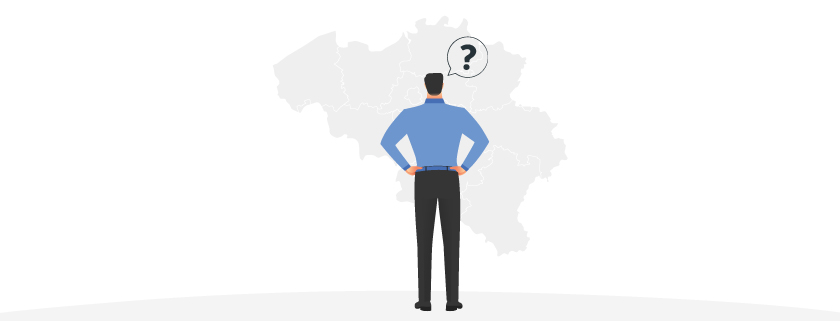What comes to your mind when you think about Belgium? Probably, cheese, chocolate, Waffles, and Beer. It is known as the heart of the European Union which foodies love to visit. Belgium is surrounded by countries like Germany, France, and the Netherlands. It covers an area of 30,000 square kilometers.
It is a small country but it is densely populated. As surrounded by Nordic countries, Belgium is impacted by different cultures which have also influenced its languages.
This country is considered one of the most complex countries in the European Union. This is because of its complex language systems. Belgium is also known as a melting pot because of its cultural diversity that came through different changes throughout history. The people of Belgium are bilingual even if we don’t count English. Approximately, 12 million people in Belgium are bilingual.
Foreigners consider Belgium, a nation with the amalgamation of two cultures, different institutions with a variety of governments. The North side of Belgium is known as Flanders and the South is called Wallonia.
This country is ruled by many leaders that have made the culture of Belgium multilingual. If you want to explore the culture of Belgium and want to enjoy its food then you must know the different languages spoken in the country. Let’s have a look at what language the people of Belgium speak.
Table of Content
Official Language of Belgium
You will be amazed to know that usually, the countries have one official language but Belgium has declared three official languages in the state reforms that were implemented in 1970. The three official languages of Belgium are Flemish (Dutch), German, and French.
The people of Belgium give great importance to language learning. People who are living in the German-speaking part of the country make their children learn the German language from an early age.
According to the Eurobarometer, 88% of Belgians are of the view that improvement in linguistic skills should be part of public policy.
Why are There Three Official Languages in Belgium?
It seems interesting to know the country has three official languages. The emergence of three official languages is the result of different historical rulers. The kingdom of Belgium was officially immersed in 1830. Before its emergence in 1830, Belgium was experiencing fierce opposition and fierce linguistic loyalty.
The history of linguistic disputes dates back to AD 843. This was the time when the Roman ruler Charlemagne divided his kingdom in the Treaty of Verdun among his three grandsons. According to this division, Wallonia became part of the Latin-speaking Roman Empire; whereas, Flanders became part of German Frankish lands.
For the past many years, Belgium faced many linguistic disputes with French, Austrian, and Spanish kings, based on the areas of rule one at a time. Belgium made itself a rich country because of the cloth trade and other cultural businesses that were conducted in peaceful times.
In 1830, the government of Belgium, despite healing the linguistic diversity, stood against the Dutch ruler, William of Orange, which gave rise to the linguistic diversity between Dutch and French-speaking communities.
The elite class used to speak French. Flemish-Dutch was popular among the working class. The official use of Flemish Dutch and French in Belgium dates back centuries in Belgium while German is a new addition.
The German-speaking part of Belgium is because of the Treaty of Versailles at the end of World War 1 when the former German Empire surrendered it to Belgium.
However, the Germans took it back during World War II. But again, it returned back to Belgium. These different political decisions resulted in the linguistic diversity in Belgium that we still witness today with its three official languages and with many minority languages.
How Many Languages are Spoken in Belgium?
You must be curious to know what other languages the people of Belgium speak. People of this country speak several non-official romance languages, as well as different non-official Germanic languages.
Romance languages and other dialects used in modern-day Belgium include Lorrain, Champenois, Picard, and Walloon. These four languages are related to French and the Belgian government implemented them in 1990.
The minority languages spoken in Germany include Limburgish, West Flemish, and Luxembourgish. Other dialects spoken in Germany are Brabantian, East Flemish, Ripuarian, Moselle Franconian, Ripuarian, and Low Dietsch.
Another language spoken in Belgium is Morals. Brusseleir is another for it. This language is a mixture of French and Dutch language. This language is widely popular in Brussels. However, this language is in danger.
Belgium is also an inhabitant of Ashkenazi Jews, who reside in Antwerp. They made up a large community of 30,000 Yiddish speakers. This is the only Jewish community living in Belgium, and Yiddish is its dominant language. The presence of the Jewish community in Belgium has always been there, even before the Holocaust, the mass slaughter of Jews, and the high influx of Jewish migrants to Belgium. To maintain the Yiddish language as well as the lifestyle of Jews, they would often have a separate network of schools. These schools provide education entirely in Yiddish.
The other ethnic group residing in Belgium is the Northwestern Romani group, which speaks Sinte Romani. The linguistic diversity in Belgium also includes immigrant languages because of the large number of immigrants that are moving there. These immigrant languages include Spanish, Turkish, Arabic, Berber, Italian, Greek, English, and Polish.
1. Flemish
People in the northern portion of Belgium (Flanders) speak the Dutch-speaking Flemish language. This region is the hub of the culture, language, and history of Belgium, and neighboring communities also have an impact on it.
Around 60% of the population resides in this area. The people living in this area speak Flemish, which is mutually intelligible with Belgian-Dutch. There is a slight difference between Flemish and Standard Dutch concerning vocabulary, idioms, and pronunciations. Any person who understands Dutch will not have any problem speaking Flemish.
2. French
French is the second most-spoken language in Belgium. The French-speaking community makes up 40% of the population. This population resides in the southern Wallonia region and the capital city of Brussels.
The French language in Belgium is different from the French in Switzerland. It contains some words that are ancient in France and have taken many loanwords from Walloon, Picard, and Dutch.
If you are aware of standard French, then understanding the French that Belgians speak will sound a little tough to you.
3. German
German is the national language of Belgium. However, only a few people speak it. According to a rough estimate, only 1% of the entire population speaks the German language.
The German-speaking community lives in the eastern region of Liege. This region became part of Belgium after World War 1. The amazing thing is that German in Belgium is mutually intelligible with standard German.
4. Luxembourgish
Luxembourgish often seems like a mixture of German and French. However, many experts recognize it as a separate language. It’s actually a West Germanic language popular mainly in Luxembourg. It is a dialect of German. According to a rough estimate, 600,000 people speak Luxembourgish around the globe. The residents of the Arlo region in lower Belgium often speak this language.
This language is the standard form of the West Germanic language. Although this language has no recognition at the national level, it is the minority language of the French community residing in Belgium.
Other Languages Spoken in Belgium
Belgians speak a lot of different languages and dialects. However, this depends a lot on what region you’re in. That said, you should be aware of a suitable regional language so that you don’t miscommunicate or offend locals.
1. English
Although no official region in Belgium speaks English, it’s popular because the education system in the country shows an inclination toward teaching it. Moreover, about half of the residents of Belgium are from foreign nations. This is also part of the reason why English is a growing language in Belgium alongside its national languages.
2. Walloon
Belgium’s French region, which stretches to the middle of Belgium, speaks this unique dialect. You will often find old generations using this dialect, especially in rural areas of the country. Experts consider it an outdated version and dialect of French. As a result, speakers of this dialect continue to dwindle.
Which Language Should you go for if you are in Belgium?
In many European countries, many languages are integrated to form a single core language. Moreover, they have set up a system where different languages can identify their existence without any problem. Unfortunately, the linguistic diversity in Belgium is different.
Understanding Belgium’s native language is a tedious task. The communities that speak different languages don’t have any harmony. Therefore, you need to be very careful in selecting the language in Belgium.
If you are planning to visit the north of Belgium, then Flemish Dutch is useful for you, and if you want to visit the south, then the French language will be beneficial for you. In addition, if you want to visit Liege in the eastern part of the country, don’t forget to have a German phrasebook.
Languages Spoken in Brussels
Brussels is the capital city of Belgium and contains 19 municipalities. The Brussels capital is located in the central portion of the country and it is part of the French and Flemish communities of Belgium. Brussels is the determining factor in dividing languages in the country.
Although this city is located in the Dutch-speaking Flanders area, the majority of people living in this city speak French. According to the 1846 language census, 39% of people spoke French, whereas 61% spoke Dutch.
Again, in the 1900s, the statistics of the city showed more French speakers than Flemish and Dutch speakers. At present, 80% of the people living in Brussels speak French as their primary language.
Brussels is similar to Paris in the way that locals are not happy if ex-pats or tourists speak to them in English. Therefore, they need to use French words in the conversation.
Generally, Brussels is a monolingual city. It supports both the Flemish-Dutch community and the French community. Therefore, you will find municipal facilities and road signs in both French and Flemish Dutch.
In addition to it, the French community in Brussels changed its name to the Walloon-Brussels Federation to make a political impact.
Don’t Speak the Wrong Language in Belgium
You cannot learn all the languages spoken in Belgium. Thus, to communicate with people from a different region, you should seek the assistance of translation services. If you are in Wallonia, then don’t communicate with anyone in Flemish because they won’t understand it and there is a chance of miscommunication.
On the other hand, if you are in Flanders, you should not communicate with the people in French. This is the best solution to avoid any conflicts between the native languages. Flemish and Walloons don’t like to be communicated with in the wrong languages.
Wrapping Up
There is no specific answer to the question, What is the official language of Belgium? Due to the influence of different rulers in Belgium, the country is still toiling hard to bring balance between Flemish Dutch speakers and French speakers along with the minority German-speaking community.
If you have any plans to visit Belgium, then it’s very important to understand what languages Belgians speak.
Whether you are on vacation or want to do business in Belgium, speaking the wrong language can offend the native people. Moreover, it can result in the cancellation of a business deal. This does not mean that you should cancel your trip to Belgium. It is a beautiful country with an enriching culture. In this culture, you will find a beautiful amalgamation of both Romance and Germanic words.
If you are unable to speak the official languages of Belgium, then professional translation services are of great help to you. With the help of these translation services, you can get an insight into Belgium’s rich culture.
Read More:
- What Language Do Amish Speak
- How Many People Speak Spanish Language
- How Many Languages are Spoken in Turkey
- How Many Languages are Spoken in China
- How many languages are spoken in India
- What Languages are Spoken in Israel
- What Languages are Spoken in Brazil
- What Language is Spoken in Egypt
- Which Languages Are Spoken In Greece
- What Language is Spoken in Ukraine




